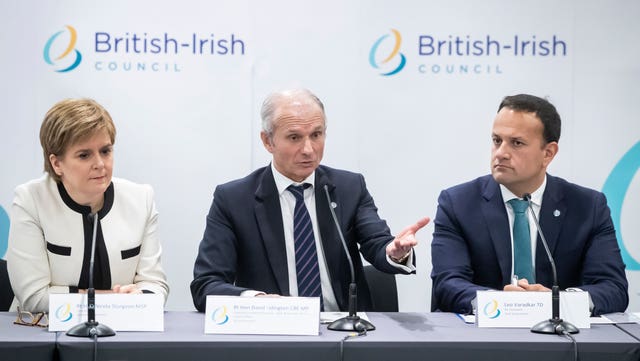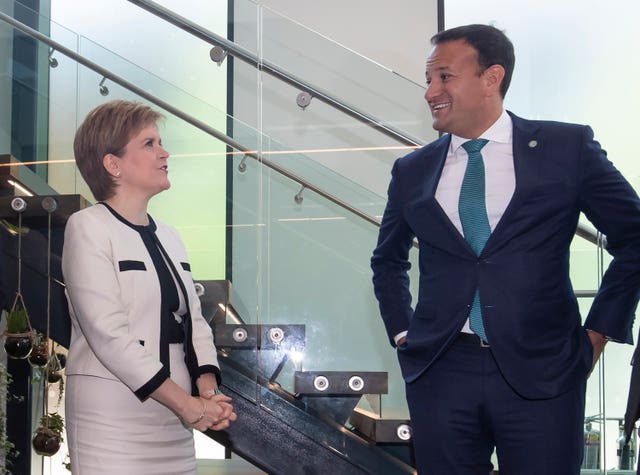Ireland’s Taoiseach said whoever becomes the UK’s next prime minister will get a “fair hearing” from the EU, but warned “we mean what we say” about not re-opening negotiations on the Withdrawal Agreement.
Leo Varadkar spoke alongside the UK’s Minister for the Cabinet Office, David Lidington and Scotland’s first minister Nicola Sturgeon at the end of a British-Irish Council summit meeting in Manchester.
Varadkar said it would “not be helpful” for him to comment on the Tory leadership race.
In Manchester today for a meeting of the British Irish Council. It’s an important forum to discuss shared priorities across these islands. As part of our discussions today, we’ll be talking about how we can work together on climate action. pic.twitter.com/88NaisFv5V
— Leo Varadkar (@LeoVaradkar) June 28, 2019
He added:
At the same time, it needs to be understood that we also mean what we say. That is the Withdrawal Agreement won’t be re-opened, without a Backstop there will be no transition period or implementation phase, but that we are willing to examine the joint political declaration and make amendments to that if that enables us to proceed to an orderly Brexit with a guarantee there will be no hard border between north and south which is our shared objective.
Lidington said both Tory-leadership contenders, Boris Johnson and Jeremy Hunt, have said they do not want a no-deal Brexit, and it is important to “take their word on that”.
He also said it was “very clear” tariffs and checks would be applied to UK trade, “on day one” of a “no-deal crash out”.
But he said there will be a “window” when EU leaders will want to hear what Theresa May’s successor has to say, and the Government’s position was still to leave with a deal.

But Sturgeon said there was now a “real danger” of a no-deal “crash out” becoming “inevitable” – and it was “futile” to waste time trying to re-negotiate.
She said:
I think there’s a real danger right now, the positioning of the contenders for leadership of Tory Party starts to make no deal inevitable.
I think there’s an alternative to no deal, which is no Brexit through a second referendum, but there’s a danger we end up on a path to no deal that’s very difficult to stop and that is of significant concern.
I do think a responsible government and responsible prime minister would make clear that avoiding no deal is an absolute priority, and would not allow UK to crash out of the EU with no deal.
What I think we should all seek to avoid is further time being wasted in this process with a futile attempt to re-open and re-negotiate the Withdrawal Agreement, when the European Union has, and I work on David’s comment that he takes them at their word, because I think it’s very dangerous to continue to waste time assuming something can be achieved that the European Union has made very clear, can’t be achieved.”
Busy morning of engagements at 32nd British Irish Council with FM @NicolaSturgeon holding meetings with Welsh FM @MarkDrakeford & Isle of Man Chief Minister @HowardQuayleMHK ahead of the main summit #BICUK pic.twitter.com/mWXqZDhfN1
— First Minister (@ScotGovFM) June 28, 2019
Sturgeon continued:
Yes I do think Brexit can still be stopped. Let’s be frank about it, time is running out, but if we get and this would be a pre-requisite of this, Jeremy Corbyn and the Labour Party into an unequivocal position of supporting a second referendum, then I think the conditions start to be there for a majority for a second referendum in the House of Commons – and that is the route to stopping Brexit.
Of course you can’t take for granted what the outcome of a second referendum would be, but that is the route to stop it.
Certainly from the discussions I’ve had in Brussels in recent times, it’s very clear to me that there’s a significant possibility or probability that the only way of getting a further extension beyond the 31st of October would be for some public democratic process like a referendum or perhaps a general election.
Both Sturgeon and Varadkar said economic assessments forecast rising unemployment and negative consequences for growth and government budgets in their countries if the UK leaves without a deal.
The Taoiseach added: “No one is really going to know for sure what the extent of harm will be or how it will play out.”
Both were asked if Brexit could be stopped during a press conference at the end of the summit.
Varadkar said:
Well whether Brexit is stopped or not isn’t my business, that’s a decision for Parliament and the people of the United Kingdom.
But I think no deal can be stopped and there’s lots of ways that can be done through revocation of Article 50, Parliament deciding that Parliament thinks there should be a second referendum, or by ratifying the Withdrawal Agreement.

Sturgeon said:
Yes I do think Brexit can still be stopped. Let’s be frank about it, time is running out, but if we get and this would be a pre-requisite of this, Jeremy Corbyn and the Labour Party into an unequivocal position of supporting a second referendum, then I think the conditions start to be there for a majority for a second referendum in the House of Commons – and that is the route to stopping Brexit.
Of course you can’t take for granted what the outcome of a second referendum would be, but that is the route to stop it.
Certainly from the discussions I’ve had in Brussels in recent times, it’s very clear to me that there’s a significant possibility or probability that the only way of getting a further extension beyond the 31st of October would be for some public democratic process like a referendum or perhaps a general election.









